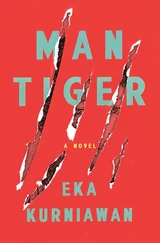“Goodnight,” Maya Dewi would reply, before closing her eyes.
There still was no lovemaking, even after one entire year had passed.
One night Maman Gendeng went to see Dewi Ayu in her chambers at Mama Kalong’s whorehouse, just as he so often used to do. Dewi Ayu’s only guest had already gone.
“Why have you come here?” asked Dewi Ayu.
“I can’t hold back my desire.”
“You have a wife.”
“She is too adorable to be harmed. She is too pure to be touched. I want to sleep with my mother-in-law.”
“You’re a really screwed up son-in-law,” said Dewi Ayu.
And they made love until morning.
The strange friendship between Maman Gendeng and Shodancho began at the card table in the middle of the market. The friendship was a strange one because ever since Shodancho had slept with Dewi Ayu and Maman Gendeng had come to the military headquarters, an eternal animosity had been planted deep inside them both. And this was exacerbated by the fact that Maman Gendeng’s men always had problems with Shodancho’s soldiers.
The soldiers didn’t like to pay at the whorehouse, but the preman were there to take care of anyone who slept with the whores without paying. The soldiers also didn’t like paying at the beer gardens and taverns — in fact, the owners didn’t make a big deal out of that, because the soldiers never drank too much, but the preman had practically taken up residence in the beer gardens and felt it was a slap in their face. What’s more, one of the preman was always getting caught by the military for something silly like being drunk and throwing stones through a shop window, then the soldiers would rough him up behind their headquarters before letting him go all black and blue. All of this provoked small scuffles between Shodancho’s soldiers and Maman Gendeng’s posse.
But up until this point, the problems could be easily solved. If a preman was captured by soldiers and beaten until he was black and blue, then the posse would capture a soldier passing by on the road and gang up on him in a cocoa plantation. If a criminal was captured and held, Maman Gendeng would come to free him with a little ransom money to shut those soldiers’ mouths. In the middle of all these disputes were the police, but they preferred to sit at their posts and throw up their hands at the whole business.
Many people had hoped that Shodancho would quickly take care of these public enemies, but just as with Edi Idiot, this was nothing but wishful thinking, since Shodancho was busy dealing with his own family problems and the Fishermen’s Union’s demands and he had no time to think about Maman Gendeng and his friends. And so Shodancho’s popularity as a city hero plummeted — in fact, the people actually began to distrust him and suspect that the military was conspiring with the preman to cause all of this chaos, especially when they remembered that the two men, Shodancho and Maman Gendeng, were both Dewi Ayu’s son-in-laws.
So it got a little chaotic when one a day a soldier from the military headquarters tussled with one of the bodyguards at Mama Kalong’s brothel. The dispute began over a village girl both men claimed for themselves. They fought in the street, and then their friends showed up. Their private scuffle became a heated brawl between a group of soldiers and a gang of thugs.
Who knows how it started, but in the end, after an hour of wild fighting, almost twenty shade trees had toppled over along the side of the road and shop windows stood shattered. Boulders and old scorched tires were lying in the street, two cars had been overturned, and the police station was burned.
The terrified people hid in their homes. The fight brought the usually bustling Jalan Merdeka to a standstill. On one side, a posse of preman stood watch with sabres, samurai swords, spears, iron clubs, machetes, stones, and Molotov cocktails. They even had hand grenades and weapons left over from the guerrilla army. Meanwhile, on the other side of the street soldiers, not just Shodancho’s men but from all the military posts in the city, also stood guard with loaded weapons.
That day everything was quiet and still, as if the city had been abandoned for years. A tense silence crept across the land, along with the fear that a civil war would break out in that city, which had not known a time of peace ever since the war for independence. Many were fed up with the preman , and thought to themselves that if war broke out they would side with the soldiers. But many others were sick of the soldiers, who always seemed so full of themselves, and thought that if war broke out they would definitely help the preman .
But ultimately they would all kill each other, sparing no one.
That whole afternoon the sounds of exploding grenades and Molotov cocktails and pistol shots could be heard whistling in between shops and houses. Nobody knew if anyone had been killed yet. Wrapped up in his never-ending domestic problems, Shodancho was slow to hear about these dire conditions and once he did, he was annoyed that some village girl could lead to the destruction of the heart of the city. He decided he would put that wretched soldier in solitary confinement for seven days and seven nights without food or water, not caring if he died. But first he had to prevent widespread destruction. So he quickly sent his most trusted soldier, Tino Sidiq, to talk to Maman Gendeng, to call for a cease-fire and make a peace treaty.
Maman Gendeng, who was enjoying the honeymoon period of his bizarre marriage, had also just heard about the fighting on Jalan Merdeka, but he didn’t care that much either. He was just annoyed that people were still getting in the way of his efforts to build the happy life that could make up for all those years he had spent wandering, aimless and lonely. He felt sure the scuffle must have been started by some rude soldier.
But his twelve-year-old wife convinced him that he should take care of the chaos, and Maman Gendeng finally went out, after he and Tino Sidiq agreed that he would meet Shodancho in a neutral spot halfway between the bus terminal and the military headquarters. That spot was the marketplace.
They chased out the four men — a salt-fish seller, a rickshaw driver, a coolie, and the husband of one of the clothing merchants — who were sitting around a card table in the middle of the market betting with coins that jingled from one corner of the table to another. The card players withdrew and stood watching from the poultry seller’s stall, as Shodancho finally appeared. All the market activities ground to a halt as the merchants and customers froze in their tracks, waiting for the two men to decide whether a horrible civil war would break out that afternoon or be postponed for years, maybe even centuries to come.
Shodancho said the preman should immediately retreat and surrender all their weapons, because only the military had the right to bear arms. But Maman Gendeng found that unsupportable, since the soldiers used their weapons with impunity. Shodancho spoke again:
“Oh my dear friend, we will not solve this problem by quarrelling like children.” And then he continued, “All right then, for the time being there will be no disarmament, but order your men off the streets and tell them that there must be no more rioting crowds or broken shop windows.”
“Oh my dear Shodancho,” said Maman Gendeng, “then surely you agree that there must be no more disputes by armed soldiers over village girls or whomever. And, just like any other man in this city, the soldiers will have to pay for every visit to the whorehouse, and pay at the beer garden every time they drink, and pay the bus driver every time they take a ride. There are no more golden boys here, Shodancho.”
Читать дальше











